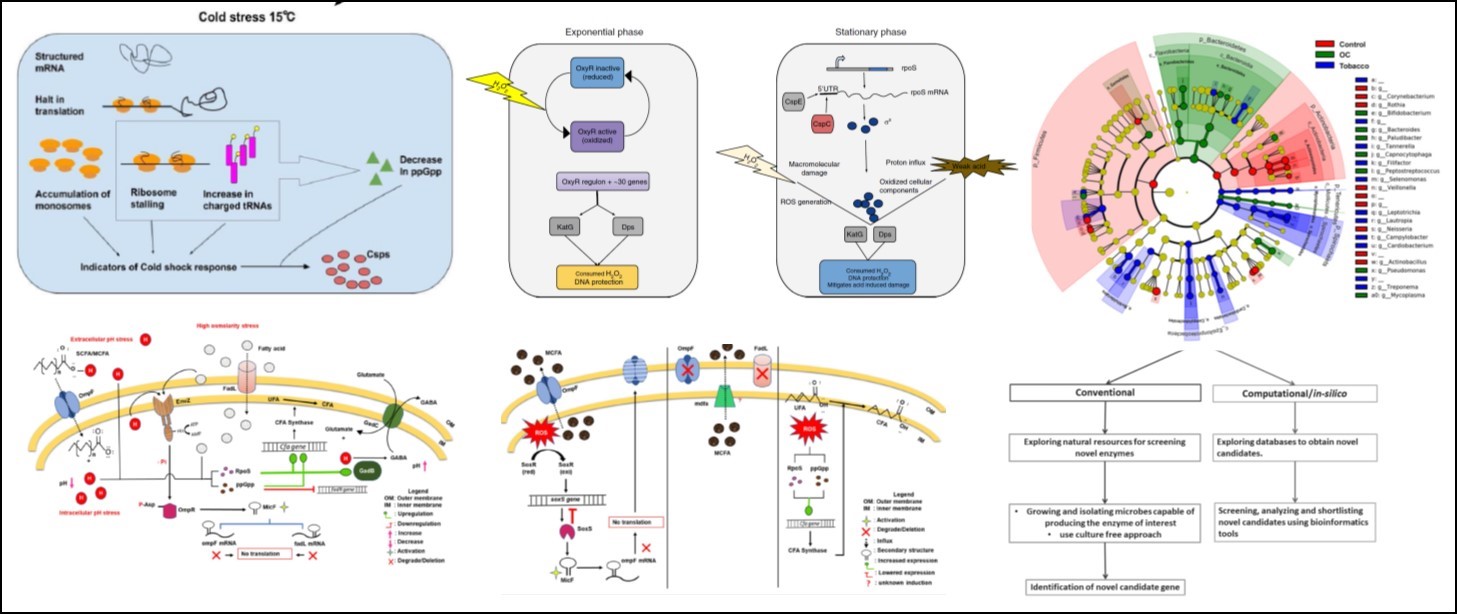
Area of Research
Stress biology, Enzyme engineering, Oral Cancer, Fatty acid production


Shriya Sawant
Currently working as Researcher at University of Michigan School of Dentistry
2017 -2023
Research Area: Oral Cancer
Research Summary:
The human body harbors approximately ten times more microbial cells as compared to human cells. The fast-growing field of metagenomics has enabled us to understand the deeper relation between these microbes present in our body and the host cells, in maintaining health as well as in causation of a disease, including cancers. India is the hub of oral cancer cases, most of which are attributed to lifestyle risk factors such as tobacco chewing, alcohol consumption, smoking etc. But a significant fraction of oral cancer cases does not show any association with a known risk factor. Our research revolves around deciphering the oral microbiome of Indian oral cancer patients using metagenomics approach and to deduce the correlation of microbial composition of the oral cavity with causation or progression towards oral cancer. We also aim to find the pathways affected in oral cells due to interaction with significant bacterial species which can lead to carcinogenesis.
Publications
Sawant S, Dugad J, Parikh D, Srinivasan S, Singh H. (2023) Oral microbial signatures of tobacco chewers and oral cancer patients in India. MDPI Pathogens. 12(1): 7

Asmita Kamble
2017 registered
Research Area: Enzyme engineering
Research Summary:
Enzymes are natural catalysts used to speed up chemical reactions. Enzymes with better properties are applied in various industries such as food, animal nutrition, cosmetics, medication, paper and pulp. Enzymes are required with desired properties like high specificity and functional activity, thermostability and activity at wide range of pH. There are two approaches to obtain enzymes with superior properties: bioprospecting natural resources to find novel enzymes or engineer the existing enzymes. Till date natural resources such as hot springs, activated sludge, sea brine pool are explored via bioprospecting or Metagenomic approach. The rational, semi-rational or directed evolution protein engineering approaches along with computational tools are adopted to engineer enzymes. One such enzyme is phytase whose thermostability and activity at wide range of pH is of utmost important in feed and fuel industry. Phytase which is a myoinositol hexakisphosphate phosphohydrolases utilize phytate complex as substrate and catalyzes the hydrolysis of O-P bonds in phytate which results in release of products such as inositol and its intermediate derivatives along with phosphate and other micronutrients. There is a demand of thermostable phytase in feed and fuel industry, since introduction of phytase has potential to reduce environmental pollution, natural resource management, increase bioavailability of micronutrients and increase bioethanol production, reduce feed cost. Few commercial phytases are available but they exhibit reduce activity as temperature increases. We aim to obtain a novel phytase enzyme with improved thermo-stability using in-silico and conventional Bio-prospecting along with enzyme engineering approach.
Publications

Evieann Cardoza
2018 registered
Research Area: Bacterial Stress Biology
My research focuses on stress studies concerning bacteria and my interest lies with using Escherichia coli as the model organism. I am trying to examines various stressors and its impact on RNA chaperones thereby deciphering their role in the bacterium’s stress tolerance.
Publications

Neha Rajiv Sawant
2020 registered
Research Area: Fatty Acid production
With increasing population rate, and their demands for non-renewable fossil fuels (like petroleum, natural gas, and coal) to meet the energy requirements, has provoked many researchers to raise a concern to search an alternative energy source. Therefore, there is need for renewable form of fuel. The basic unit of these fuels are fatty acids which can be obtained from few algal, fungal or bacterial sources. Apart from serving as an alternative fuel source, fatty acids have also grabbed great attention in various industries like food-feed industry, cosmetic industry, textile industry, mechanical industry etc. In my research project, one of the possible candidate, E. coli will be used a role model to produce high levels of fatty acids using various molecular approaches.
Publications